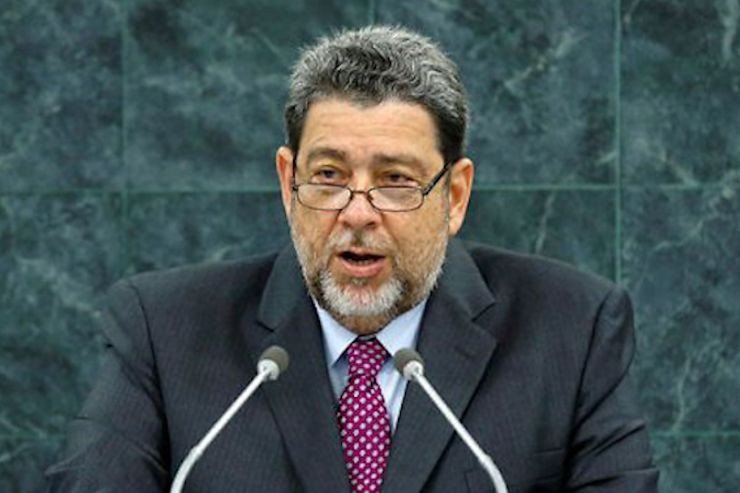Statement
by
H.E. Dr. Ralph Gonsalves
Prime Minister
Check against delivery
Warmest commendations to the Deputy Prime Minister and Minister of Foreign Affairs of the Republic of Vietnam, His Excellency Mr. Pham Binh Minh, to His Excellency Antonio Gutteres, Her Excellency Mary Robinson of the Elders, and distinguished Foreign Ministers and Ambassadors.
COMPLEXITIES AND CHALLENGES
The many-sided complexities, contradictions, and challenges manifest in the global political economy and system of international relations conspire to demand, more than ever, a United Nations fit for the purpose of ensuring a multilateral, rules-based international order of peace, security, prosperity and sustainable development for all of humanity.
Indeed, for a country like Saint Vincent and the Grenadines, an exemplar of “small island exceptionalism,” awashed as it is with an historical bundle of debilitating and uplifting legacies and contemporary encumbrances and possibilities of our Caribbean Civilization, the necessity and desirability of a vibrant and well-functioning United Nations is a matter of the highest priority. We signal this with my presence.
THE CHARTER OF THE UN
The foundation stone, known as the Charter of the United Nations, was shaped and laid, by outstanding visionaries and realists, to meet the immediate exigencies of the post-world war global condition and the foreseeable prospectus of, and for, an evolving comity of nations to dwell together, if not always in unity, but cooperatively in the pursuit of peace, security and prosperity.
Each generation, in humanity’s quest for a better life, is always faced with inherited and fresh challenges. Accordingly, each generation is both blessed and burdened with a mission of continuity and change as the circumstances admit. At the dawn of the second decade of the 21st century and in the 75th year of the UN’s existence, it is justifiable and wise, to remind ourselves of the enduring core principles and purposes of the UN, to recommit to them, and sensibly to reshape and reform our UN in appropriate ways to better execute its mandates in a rapidly changing global order. But what we must not do is to reject or dismantle the foundation stone which the original builders had so carefully put in place and which their esteemed continuators have so painstakingly maintained or fortified.
In this regard, Saint Vincent and the Grenadines commends Vietnam for spearheading the initiative to hold this debate and we endorse the Presidential Statement just adopted. I adopt and call as my own the words of the distinguished Secretary General and the Chair of the Elders.
INTERNATIONAL AND MULTILATERAL ORDER
Fundamentally, the Charter of the United Nations codified and developed an efficacious international legal framework to regulate relations between sovereign states, in a rational and principled way, so as to maintain and promote international order in the interest of all humanity. This international legal framework is, by its very nature, multilateral. It is axiomatic that there cannot be a unilateral United Nations; that is a self-evident oxymoron! In holding aloft international law of a deepening multilateralism, the Founders, drawing upon right reason and experience, proceeded to codify and elaborate the requisite statues, rules, settled customs, and norms for authoritative decision-making.
THE BASICS OF RIGHT AND WRONG
Every member state of the UN knows fully well that which is plainly acceptable or unacceptable within the terms of the Charter and international law. To be sure, there are always spheres of genuine contention and disputatious conversations derived from national interests or technical interpretation. But too often, there is an inclination of too many member states to present what is plainly wrong as right and vice versa.
We all know that it is unacceptable for one state or a group of “likeminded” states, to drive a horse and chariot through the bedrock principles of sovereignty, independence, the equality of states, non-interference and non-intervention, and the peaceful settlement of disputes. We all know that it is plainly wrong, similarly, for any state or group of states to be in quest of hegemony or to be engaged in the unilateralist weaponising of international trade, commerce, finance or banking. We all know that the treasured right to self-defence cannot be exercised disproportionately or outside the boundaries of international law. We all know, too, that it is unacceptable to support or harbour terrorists and international criminals, to facilitate the spread and use of nuclear, chemical and biological weapons, or to deny people basic fundamental human rights. Yet, in these hallowed halls of our UN there is a daily diet of justification for that which is plainly wrong or unacceptable. We ought to resolve to desist from so-doing.
SMALL STATES AND THE UN
Mr. President, one of the essential contributions to be made by small states like ours is the tireless advocacy for timeless principles enshrined in international law. With no ideological or geostrategic axes to grind, we consider it our solemn obligation not only to articulate these principles, but to ensure that they are applied consistently and upheld in the international community as universal truths, rather than selective, uneven and unpredictable tools to further hegemonic power or great power ambition.
The UN Charter also promises us development and economic well-being which bear upon international peace and security. Accordingly, our best collective efforts require the fixing of underdevelopment, economic insecurity and vulnerability to external shocks so as to limit unnecessary conflicts and discord.
Similarly, we must acknowledge and act upon the security consequences of climate change, the misuse and abuse of the earth’s resources inclusive of the seabed, and the weaponising of outer space.
CONCLUSION
Mr. President, as I conclude,
The arrogance of power, however derived, too often imbues human beings and nation states with a sense that restraints on them are impermissible. This corrupting power is ignoble which slowly, even imperceptibly, deprives the powerful of much virtue that they possess. Powerlessness, too, can be, and oft-times, is debilitating. Powerlessness invites cowardice and opportunism of the meek; it is also a strong stimulus for solidarity. In the end, an absence of virtue, a tendency of ignobility, an irresponsibility, and a rank hypocrisy are clear and present dangers which attend both the powerful and the powerless, though not in equal measure. The metaphoric cards are stacked in favour of the powerful; so, to those whom much more is given, from them much more is rightly expected. And, to the proverbial least among us, let us be steadfast to the core principles and values of our United Nations and be a conscience in this unruly and chaotic world of much promise. Hopefully, a renewed grace in our United Nations may take us to a better, more peaceful, more secure, more prosperous, place for humanity’s abode.




